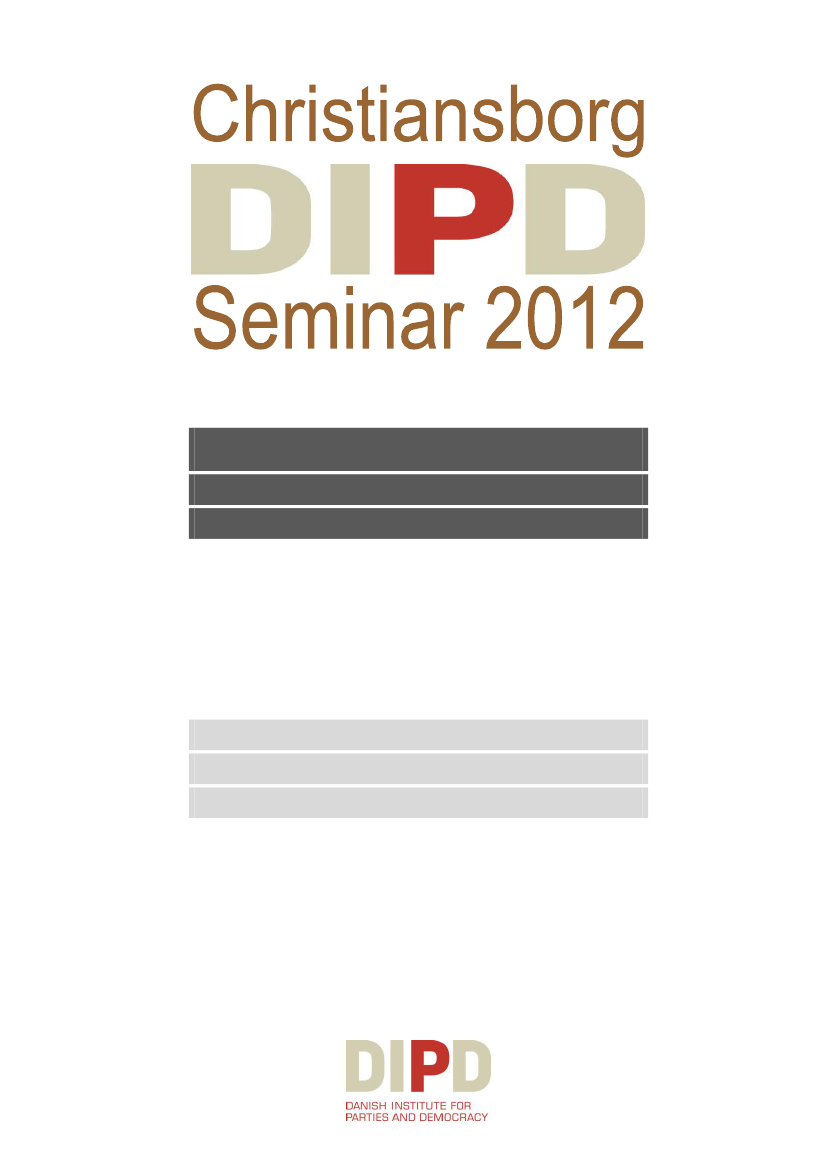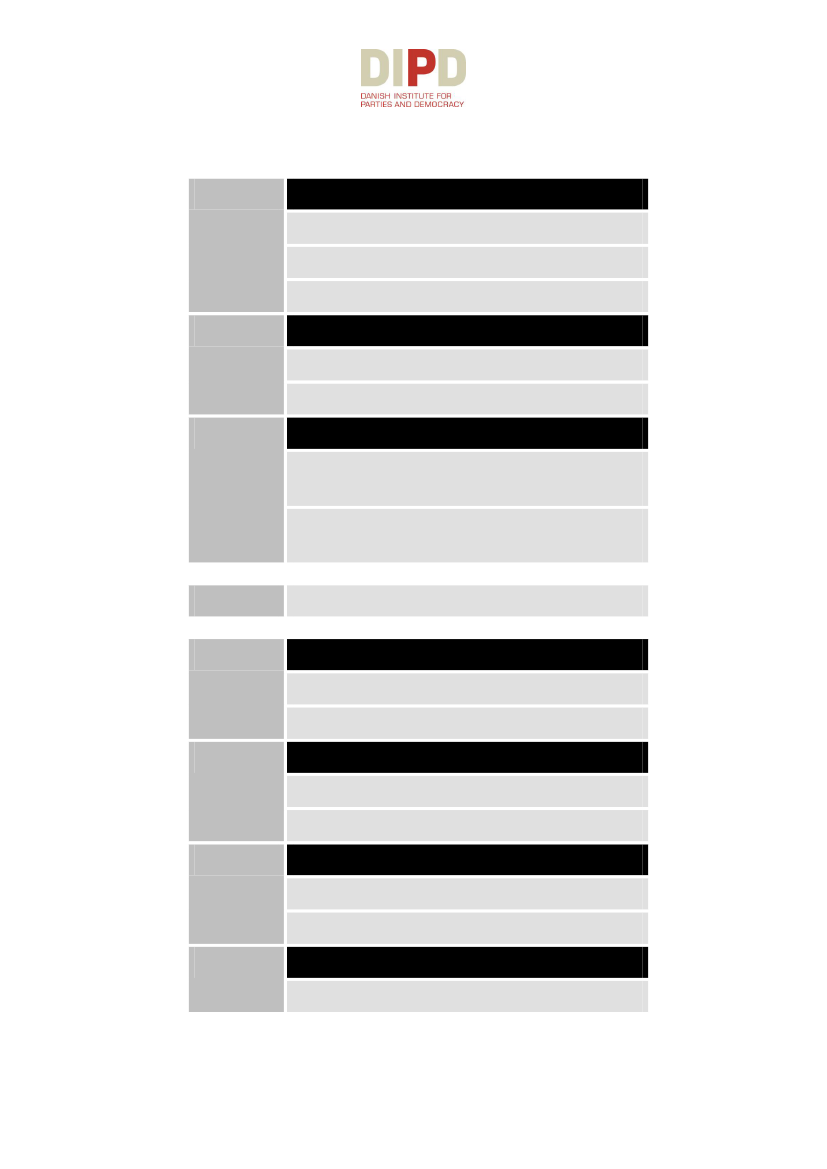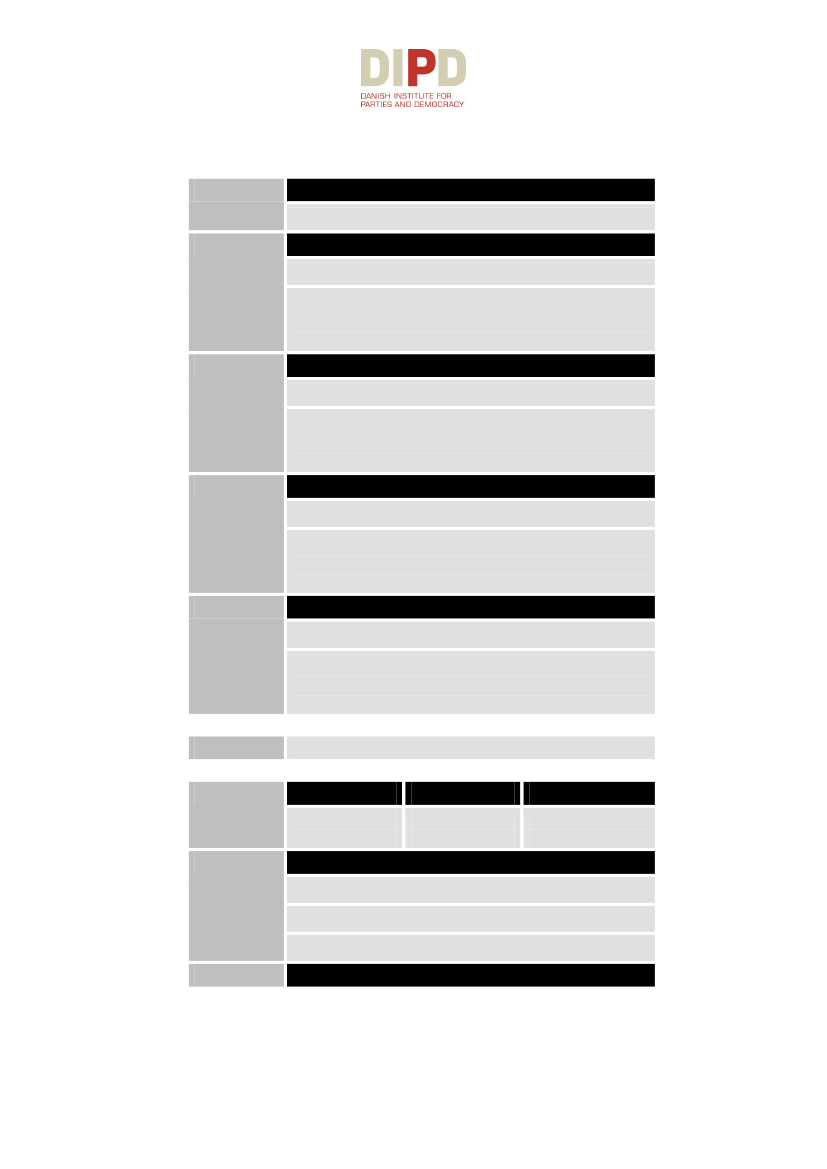Ligestillingsudvalget 2011-12
LIU Alm.del Bilag 67
Offentligt
Copenhagen, September 11-12
WOMEN IN POLITICSDIVERSITY AND EQUALITYFOR A DEMOCRATIC CULTUREManaging diversity and practicing equality are important dimensionsof a democratic culture. The focus of the seminar will be on the vari-ous ways the principles of diversity and equality are managed andpracticed in different cultural, social and political settings. Speakersand participants from all continents will share their stories and expe-riences, making the seminar a meeting and learning place in the fol-lowing areas:
Women in Local Level PoliticsYoung Women in PoliticsWomen in Transition ProcessesThe 1stday will take place at Christiansborg - with high level speak-ers offering their visions. The 2ndday will be a workshop day withsessions on the three themes finalized with an action plan for howpolitical party assistance can support women in the three areas.The seminar is organized on the basis of ‘invitation only’, with a ma-jor focus on political parties and party institutes in the Nordic coun-tries, Danish civil society organizations, and partners from the coun-tries around the world where the Nordic organizations are active.
1. IntroductionThe DIPD Strategy 2011-2013 “Political Parties in a Democratic Culture” states thatthe Institute will host an annual ‘flagship’Christiansborg DIPD Seminar,with a fo-cus on the Nordic cooperation partners and their partners around the world, as wellas the Danish community working on governance and democracy in different ways.thAt the Board meeting on 7 of December 2011 it was decided that the first seminarshould take place in September 2012, considering that Denmark is responsible forthe EU Chairmanship during the first part of 2012 and the Parliament and the politi-cal parties therefore are very busy.
2. PurposeThe seminar should create a space for knowledge and experience sharing amongthe different actors within democracy assistance broadly speaking, and assistancefor political parties more specifically. The seminar should facilitate and strengthenthe political environment around democracy assistance in the Nordic countries andsupport Nordic cooperation on political party assistance. The seminar should alsocreate an added value for DIPD’s work with both the institute’s own projects andthe projects of the political parties, possibly in the form of a catalogue of ideas andbest practices for including women in politics.
3. DatesThe Christiansborg Seminar will take place on Tuesday 11 and Wednesday 12 ofSeptember 2012, leading up to the International Day of Democracy on Saturday 15September. This will make it possible for participants from the Nordic countries toparticipate in the seminar and also return to their countries for Democracy Day cel-ebrations, as well as to use the presence of partners from developing countries inthe Democracy Day activities as well.
4. ParticipantsThe target group of the seminar is first and foremost people who are professionallyinvolved in democracy assistance in the Nordic countries. This includes DIPD’s sis-ter institutions and politicians involved in political party assistance projects; highlevel politicians who we would like to engage in the work of democracy assistance;and the Danish resource base of the institute, including researchers and NGOsworking with democracy assistance.The Nordic sister institutes from Sweden (party foundations), Finland (Demo) andNorway (Norad) will be invited to participate, hopefully both with politicians, secre-tariat staff and partners they work with.Although not Nordic as such, International IDEA is participating on the basis of itsrole and knowledge in the political party support arena. Other highly relevant actorsparticipating are the UNDP, Netherlands Institute for Multiparty Democracy andother institutions who have close links that have been established between DIPDand these institutions.From the Danish NGO community and resource base representatives from organi-zations like the Danish Youth Council, Kvinfo, MS/ActionAid, IMS, IMR,Kvinderådet, IBIS, Folkekirkens Nødhjælp, and KULU will be invited.
Page 2
5. Venue and logisticsThe official part [1 day] of the seminar will be held at Fællessalen, Christiansborg.ndThe workshop part [2 day] will be held in Kosmopol at the centre of Copenhagen.After online registration the participants will be contacted in order to plan travel, ac-commodation, visa etc. We have pre booked really nice rooms at the Hotel Palace,located in central Copenhagen in the close vicinity of the seminar venue. Partici-pants who cover their own expenses can also use this organising service for freeand receive an invoice for their travel and accommodation.DIPD will cover all costs for the seminar facilities; lunches and dinners during theseminar; keynote speakers; the participation of DIPD partners from developingcountries; facilitators and moderators during workshop sessions; as well as thepreparation of background documents.Nordic and other international partner institutions will be asked to cover their owntravel and accommodation. In addition some of them will be encouraged to invitepartners from developing countries, and in those cases DIPD offers to cover ac-commodation while in Copenhagen.st
6. Choice of themeA number of themes have been discussed by the board of DIPD, considering as-pects like relevance for politicians and political parties, existence of cutting edgeknowledge among partners, how they could feed into the further development ofknowledge within DIPD and sister institutions, relevance for partners in developingcountries, etc.Finally, the board decided to focus onWomen in Politics– with the understandingthat this will address the challenges ofwomen in political partiesin particular,and that the discussion will be set in the context ofdiversity and equality for ademocratic culture.While recognizing that this theme has been the focus of many seminars and con-ferences in recent years, it was also the understanding that this theme continues tobe an area where more needs to be done. In addition this is also in line with thestrategy for Danish development cooperation.
7. Structure of seminar and workshopDay 1will be theHigh level segmenttaking place in Parliament: This part will fo-cus on the thematic discussions with both academic and practitioner keynotespeakers. Panels of political leaders will discuss the themes on a political level.This day is intended to inspire politicians to be engaged in political party assis-tance.Day 2will be theWorkshop segmenttaking place at Kosmopol in the city center.The day will present practical experiences and focus on methodological and opera-tional questions and challenges, with those directly involved in the practical workbeing the major audience. Partners from developing countries will present their ex-periences in the three thematic areas.
Page 3
September 11, Day 1: High level:10:00-11:00Official openingMr. Henrik Bach Mortensen, Chairman of DIPDMr. Villy Søvndal, Minister of Foreign AffairsMr. Lars Løkke Rasmussen, Chairman of Venstre (tbc)11:00-11:30Screening of the film “Yes, Madam Minister”Mr Manu Sareen, Minister for Gender Equality,Member of Parliament from Bhutan11:30-12:30KeynotesMs Priscilla Misihairabwi-MushongaMinister for International Cooperation in ZimbabweMs Winnie ByanyimaDirector of UNDP’s unit for Gender & Development
12:30-13:30
Lunch
13:30-14:30
Panel 1: Women in Local Level PoliticsModerated by: Ms Joy Mogensen, Mayor of RoskildePresentations by partners from developing countries
14:30-15:30
Panel 2: Young Women in PoliticsModerated by: Ms Lone Loklindt, MPPresentations by partners from developing countries
15:30-16:30
Panel 3: Women in Transition PoliticsModerated by: Ms Gitte Lillelund Bech, MPPresentations by partners from developing countries
16:30-17:00
ConclusionsBy Ulla Tørnæs, MP and former Minister for Development
Page 4
September 12, Day 2: Workshop segment09:00-09:15IntroductionMr. Bjørn Førde, Director of DIPD09:15-10:15Women in Politics – methods and approachesIntroduction by Randi Davis, UNDPPresentation A: UNDPPresentation B: KVINFOPresentation C: Nordic Representative10:15-11:00Theme 1: Women in Local PoliticsIntroduction by Sumona Dasgupta, Consultant, India.Presentation A: MozambiquePresentation B: BhutanPresentation C: Tanzania11:00-11:45Theme 2: Young Women in PoliticsIntroduction by: Maryse Helbert, Consultant, Australia.Presentation A: KenyaPresentation B: GhanaPresentation C: Nepal11:45-12:30Theme 3: Women in Transition PoliticsIntroduction by : Rumbidzai Kandawasvika, IDEA, SwedenPresentation A: EgyptPresentation B: NepalPresentation C: Zimbabwe
12:30-13:30
Lunch
13:30-15:30
Workshop 1Women in LocalPolitics
Workshop 2Young Womenin Politics
Workshop 3Women in Transi-tion Processes
15:30-16:30
Reports from workshopsTheme 1: Recommendations on Women in local politicsTheme 2: Recommendations on Young women in politicsTheme 3: Recommendations on Women in transition politics
16:30-17:00
Conclusions and way forward
Page 5
8. Defining the themeManaging diversity and practicing equality are important dimensions of a democrat-ic culture. The focus will be on the various ways the principles of diversity andequality are managed and practiced in different cultural, social and political set-tings. Speakers and participants from all continents will share their stories and ex-periences.The demand for ensuring equal representation in politics is growing with particularemphasis on promoting representation of women. The agenda on women in politi-cal life is accompanied by the broader diversity agenda within the corporate sector,the educational system etc. Often affirmative action on gender is introduced by wayof codes of conducts and diversity charters.But often the exclusion of women is based on patriarchal cultures, where womenare expected to take care of their families. The political and social structures ex-cluding women will be discussed and action plans for political party assistance willbe created in the three below mentioned areas in workshops on the second day ofthe conference.To ensure a certain focus within a rather broad theme, it has been decided to focuson three aspects. DIPD is joining forces with the global web based platformiKNOWPolitics(an initiative of UNWomen, UNDP, International IDEA, NationalDemocratic Institute and Inter-Parliamentary Union) and the Danish gender institu-tion,KVINFO,to develop high quality background information in these three areas.The following should therefore only be seen as a first brief and preliminary indica-tion of the nature and scope of the three thematic areas suggested:
Women in local politics
Local politics may not be a theme that clears the front pages every day, butit is of essential importance for people all over the world that their local poli-ticians are able to understand and meet their needs. In most countries locallevel politics is about dividing the resources in the local society and as suchof great importance for the daily lives of people all over the world.The lack of women in local politics is a global issue that has been debatedfor many years. Women’s involvement in decision and policy-making pro-cesses is absolutely essential for changes in women’s political, social andeconomic status. As such women are seen as actors of change.Supporting the participation of women in local politics therefore has greatpotential for improving the lives of women in general.The workshop session on women in local politics will be focusing on howdiversity is managed in different political, social and cultural settings espe-cially within DIPD’s project countries. What are the challenges that womenpoliticians are facing in the different settings?How can political party assistance actors strengthen their efforts in support-ing women at the local level?Page 6
Young women in politics
Engaging youth and especially young women in politics is a challenge for alldemocracies. The importance of engaging youth is self-evident consideringtheir majority status in many populations and the fact that the future belongsto the youth.But will the involvement of young women in itself lead to reforms in politicalculture and political party practices? Often young women in politics aresupported on the assumption that they will be agents of change. But willyouth, and in particular young women, act differently if the basic incentivestructures of the political system remain the same?A case in point could be the Danish ‘Folketing’, which is the youngest par-liament in the world: has the youth changed the modus operandi? And doesthe traditional party organization match the demands and wishes of currenttransient and mobile trends of youth movements in such a way that it isseen as an attractive and useful channel?The workshop session on young women in politics will be focusing on howthe incentive structures in different political, social and cultural settings areincluding or excluding young women from politics. What are the challengesthat young women politicians are facing in the different settings? Whatmeasures have been useful in order to strengthen young women participat-ing in politics?How can political party assistance actors strengthen their efforts in support-ing young women to engage in politics?Women in transition politics
Women have been playing a central role in the upheavals in the MiddleEast, in many cases on equal footing with men. But women seem to bemarginalized in the formal transformation processes, and they have notdone as well as hoped for and expected in the first parliamentary electionsafter the upheavals.Women tend to be left out of political space where future governance struc-tures are negotiated. How is diversity managed in transitional faces whenfor example new constitutions are negotiated? What are the experiencesfrom earlier transition processes in Latin America, Indonesia and Turkey?There is a need to develop a special post-conflict or post-revolutionaryframework for the inclusion of women in countries that can be consideredas being in transition (which is different from the traditional concepts of‘failed’ or ‘fragile’ states).How can women be supported to participate in politics in transition phases?How do you select which women to support in an often very tense atmos-phere of transition? Should there be special or targeted criteria for politicalparty assistance to women in transition phases?Page 7







